Choosing a dog isn’t just about finding a loyal companion, it’s also about finding one that fits your lifestyle, especially if you’re committed to living health-consciously. While all dogs deserve love and care, some breeds come with health challenges that can demand extra medical attention, frequent vet visits, or specialized care routines.
For individuals who prioritize wellness and want to minimize preventable health complications, both for themselves and their pets, knowing which breeds are prone to chronic issues is key. Certain breeds are genetically predisposed to breathing problems, obesity, joint disorders, or other conditions that can affect not only their quality of life but also the time, money, and energy required to care for them.
By understanding these risks, prospective owners can make more informed choices, ensuring a healthier, more active relationship with their canine companion.
Best Dog Breeds to Avoid If You Are Health-Conscious
1. Siberian Husky

Siberian Huskies are athletic working dogs bred to pull sleds across long distances in harsh climates. According to the AKC, their endurance and strength make them one of the most active breeds, requiring consistent exercise and mental stimulation to stay balanced. Owners who enjoy outdoor activities often find Huskies to be lively companions.
Despite their hardy appearance, Huskies can experience health concerns that may discourage health-conscious owners. Eye issues such as cataracts, progressive retinal atrophy, and corneal dystrophy occur frequently in the breed. These conditions can cause vision problems that may require lifelong monitoring.
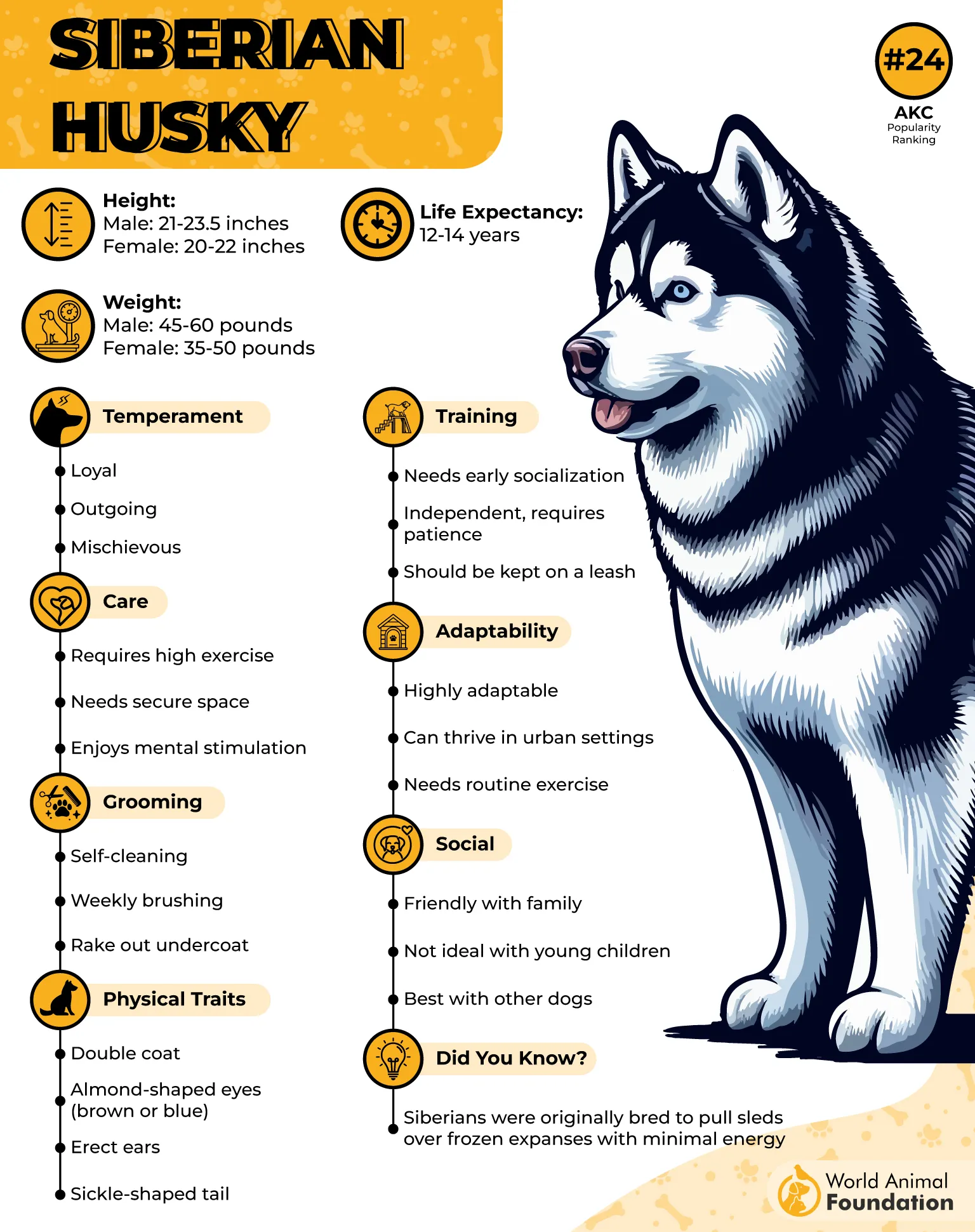
Huskies also face a risk of autoimmune disorders, including skin conditions like pemphigus foliaceus. Such issues often present as crusty sores or scaling, which may need veterinary attention over time. Proactive care is key to minimizing discomfort and avoiding more serious complications.
Their high activity levels demand significant commitment from owners. Without daily runs, hikes, or play, Huskies can become restless and develop destructive behaviors. For people looking to maintain a low-maintenance or health-conscious lifestyle, this energy level may prove overwhelming.
Even with these challenges, Huskies thrive in environments where they can burn energy safely and receive attentive care. Families who have the time and ability to provide exercise, grooming, and regular check-ups may find them rewarding. Still, their health predispositions make them less suitable for owners seeking minimal medical concerns.
Quick Tips
Schedule annual eye exams with a veterinary ophthalmologist.
Provide at least two hours of vigorous daily exercise.
2. Bulldog

Bulldogs are beloved for their stocky build and charming personalities, but they are also one of the most health-challenged breeds. Their signature short snouts put them at high risk for brachycephalic airway syndrome, which can make breathing difficult. This condition often requires surgical correction to improve airflow.
Another concern for Bulldogs is their tendency toward joint and bone issues, especially hip dysplasia. Their compact, muscular frames put stress on their joints, sometimes leading to mobility problems as they age. Weight management and moderate exercise are essential for prevention.
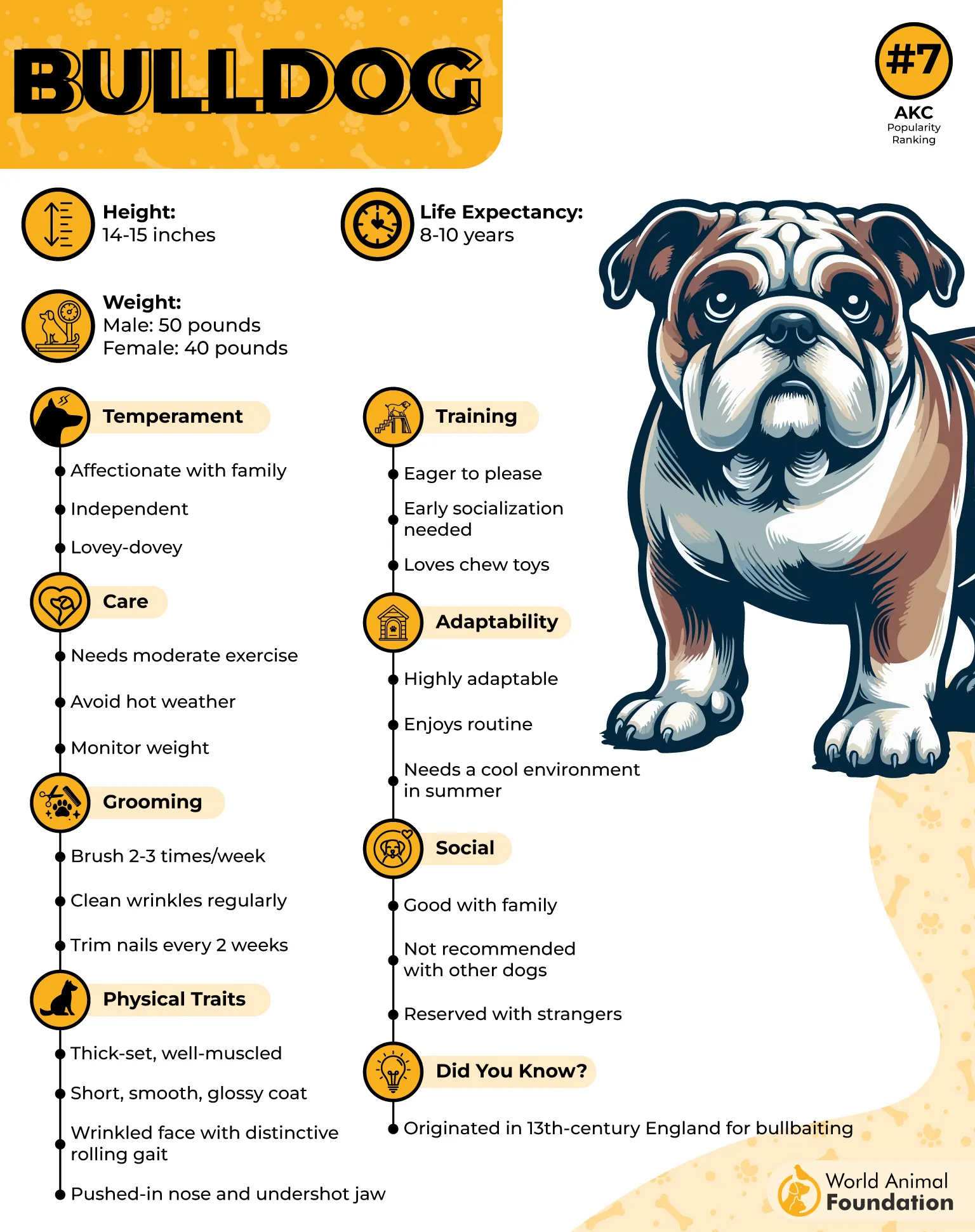
Skin care is also a critical factor for Bulldogs. Their characteristic facial folds can trap dirt and moisture, creating a breeding ground for infections. Owners need to clean these folds regularly to prevent irritation and discomfort.
From a health-conscious perspective, Bulldogs may not be ideal due to frequent vet visits and high medical costs. They rank among the breeds with the shortest average lifespans, with many living just eight to ten years. This reality can be difficult for owners seeking a more robust, lower-maintenance companion.
Despite their vulnerabilities, Bulldogs remain deeply affectionate and thrive in close contact with their families. Their gentle nature makes them wonderful companions, but only for those prepared to manage their health with diligence and consistency.
Quick Tips
Keep facial folds dry and clean daily.
Avoid strenuous exercise during hot or humid weather.
3. Pug

Pugs are small, lovable dogs with expressive faces and quirky personalities. Unfortunately, their compact skull shape puts them at significant risk for respiratory problems. Hill’sPet states that, Pugs often suffer from brachycephalic airway syndrome, which restricts airflow and can cause noisy breathing or difficulty in hot weather.
These dogs are also prone to obesity, especially since their affectionate nature often leads to overfeeding. Extra weight not only worsens breathing issues but also puts stress on their joints and overall health. A strict diet and regular exercise are essential for managing this risk.
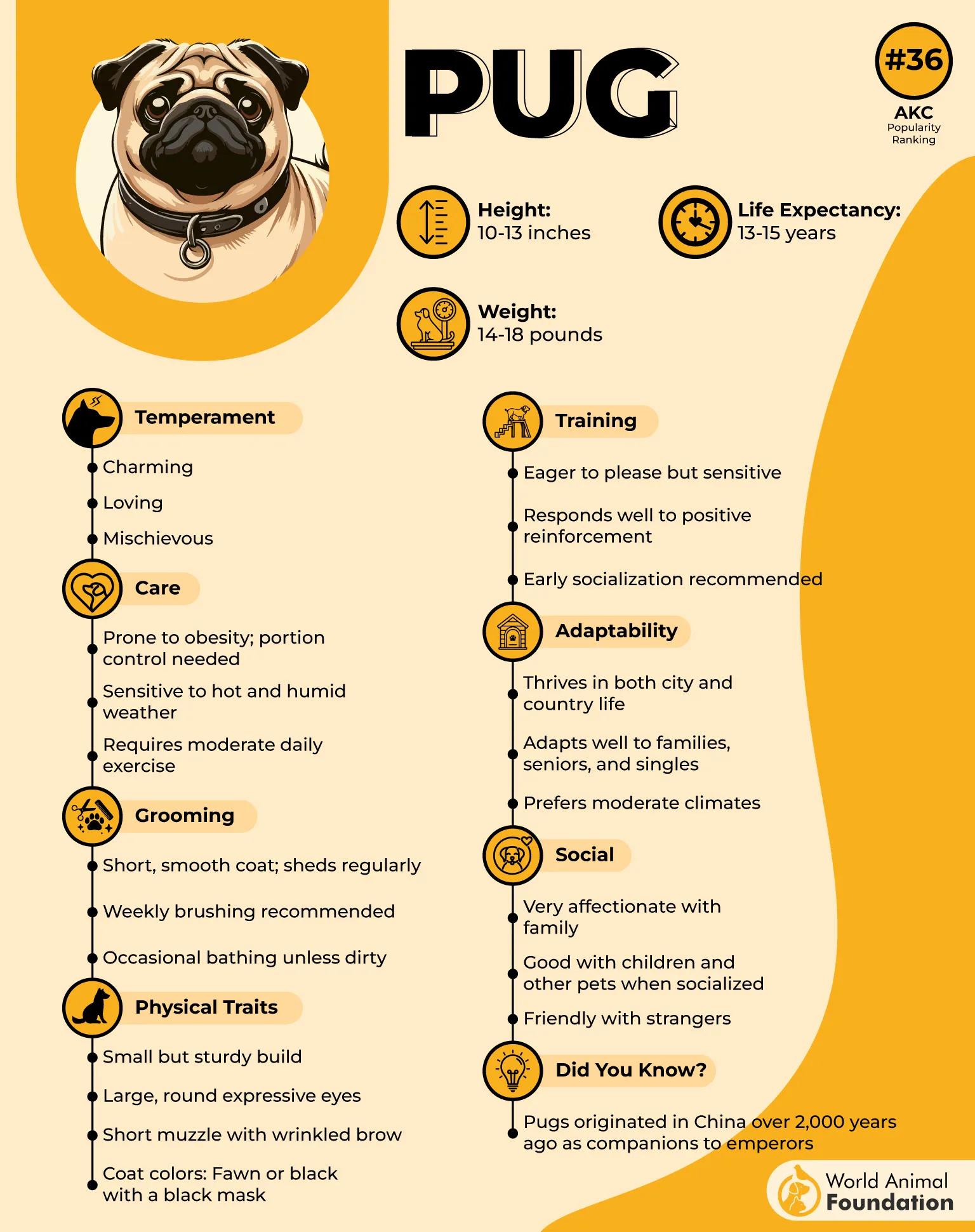
Another common issue in Pugs is eye disease. Their prominent eyes are vulnerable to corneal ulcers, injuries, and progressive retinal atrophy. Routine veterinary checkups are important to catch these problems early.
From a health-conscious perspective, Pugs may present challenges for owners who want to avoid frequent vet care. Their predisposition to multiple chronic conditions makes them high-maintenance, both in cost and daily care requirements.
Still, Pugs’ affectionate personalities and adaptability to small spaces make them endearing pets. For families or individuals willing to invest in attentive care, they can provide years of companionship and joy.
Quick Tips
Control food portions carefully to prevent weight gain.
Schedule regular vet visits to monitor eye health.
4. German Shepherd

German Shepherds are renowned for their versatility, often working as police dogs, service animals, and loyal companions. Their intelligence and trainability make them highly valued in many roles. However, these same traits also mean they need consistent mental and physical stimulation.
Health concerns are common in this breed, with hip and elbow dysplasia being especially problematic. As per PetMD, these conditions can lead to pain, lameness, and arthritis over time, making mobility difficult if not carefully managed. Owners should consider long-term orthopedic care when choosing this breed.

Digestive issues also occur more often in German Shepherds than in some other breeds. Bloat, or gastric dilatation-volvulus, can develop suddenly and is potentially life-threatening. Preventive measures such as smaller meals throughout the day can help reduce the risk.
Because they are prone to a range of health issues, German Shepherds may not be the best choice for someone seeking a low-maintenance or health-conscious pet. The commitment to veterinary visits, dietary management, and exercise can be significant. Still, with proper care, many German Shepherds live fulfilling lives well into their senior years.
Despite their challenges, these dogs remain affectionate and deeply bonded with their families. For owners who can provide the necessary time, attention, and healthcare, German Shepherds bring loyalty and companionship that is hard to match.
Quick Tips
Schedule regular hip and elbow screenings with your vet.
Feed smaller, frequent meals to help prevent bloat.
5. Beagle

Beagles are playful, sociable dogs that thrive in family environments. Their keen sense of smell makes them excellent tracking dogs, but it also means they can be stubborn and distracted by scents. They require patient training to manage this instinct effectively.
Common health issues in Beagles include epilepsy, hypothyroidism, and hip dysplasia. These conditions may require lifelong medication or management, making Beagles a more demanding breed in terms of veterinary care. Owners should be prepared for potential long-term commitments.
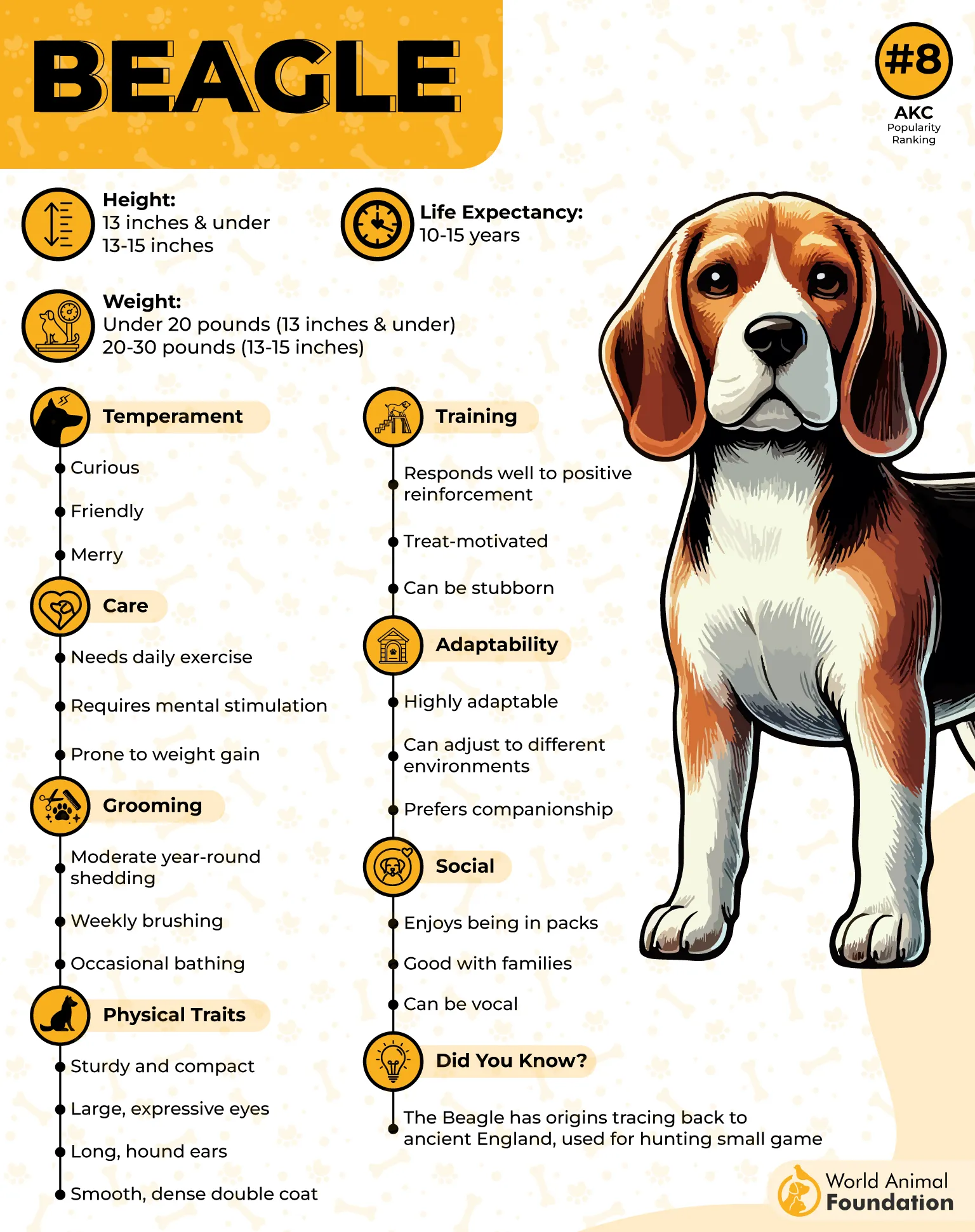
Beagles also have a predisposition to ear infections due to their floppy ears. Moisture and debris can get trapped easily, so routine ear cleaning is an important part of their grooming needs. Neglecting this can lead to chronic discomfort and infections.
From a health-conscious perspective, Beagles can be prone to obesity if not exercised regularly. Their love of food combined with moderate energy levels means owners need to watch portion sizes carefully. A sedentary lifestyle can quickly lead to weight-related health complications.
That said, Beagles bring joy with their cheerful personalities and adaptability. They are excellent companions for families who can balance their exercise, diet, and health monitoring with plenty of affection.
Quick Tips
Clean ears weekly to prevent infections.
Use measured meals to reduce the risk of obesity.
6. Shih Tzu

The Shih Tzu is a charming toy breed, well known for its luxurious coat and sweet personality. They were originally bred as lap dogs for royalty, and they continue to thrive as affectionate companions today. Their small size makes them ideal for apartment living.
However, Shih Tzus are prone to several health challenges, particularly with their brachycephalic (short-nosed) anatomy. Breathing difficulties, snoring, and sensitivity to heat are common concerns that owners must manage carefully. These issues can make them less ideal for owners who want to avoid frequent veterinary interventions.
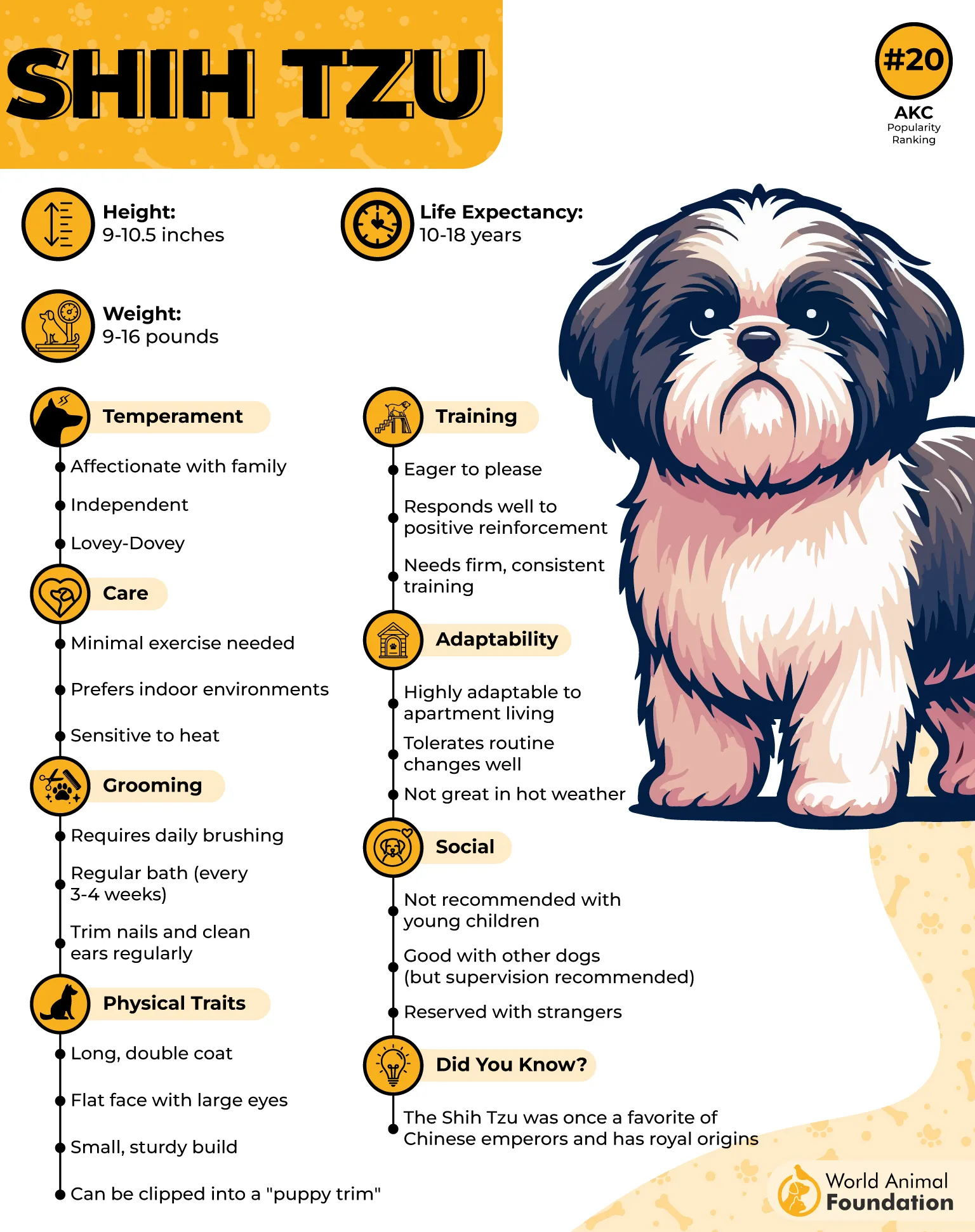
Dental problems are also frequent in Shih Tzus due to their small mouths and crowded teeth. Without consistent dental care, they can quickly develop gum disease or tooth loss. Routine brushing and professional cleanings are critical for maintaining oral health.
Another common issue in this breed is intervertebral disc disease, which can lead to back pain or mobility problems. Jumping off furniture or rough play may worsen this condition, so preventive care is important. Owners should provide steps or ramps to minimize strain.
While their health profile presents challenges, Shih Tzus are known for their affectionate, gentle nature. For families or individuals willing to commit to grooming and regular vet visits, they can provide years of loving companionship.
Quick Tips
Brush teeth daily to maintain oral health.
Limit strenuous activity in hot weather.
7. Boxer

Boxers are athletic, high-energy dogs with strong protective instincts. They are playful, intelligent, and thrive when given tasks or interactive games. Their affectionate nature makes them popular among families with active lifestyles.
Unfortunately, Boxers are among the breeds with higher risks of cancer. Mast cell tumors, lymphoma, and other cancers are frequently reported, making regular veterinary screenings essential. This predisposition may deter health-conscious owners looking for a lower-risk companion.
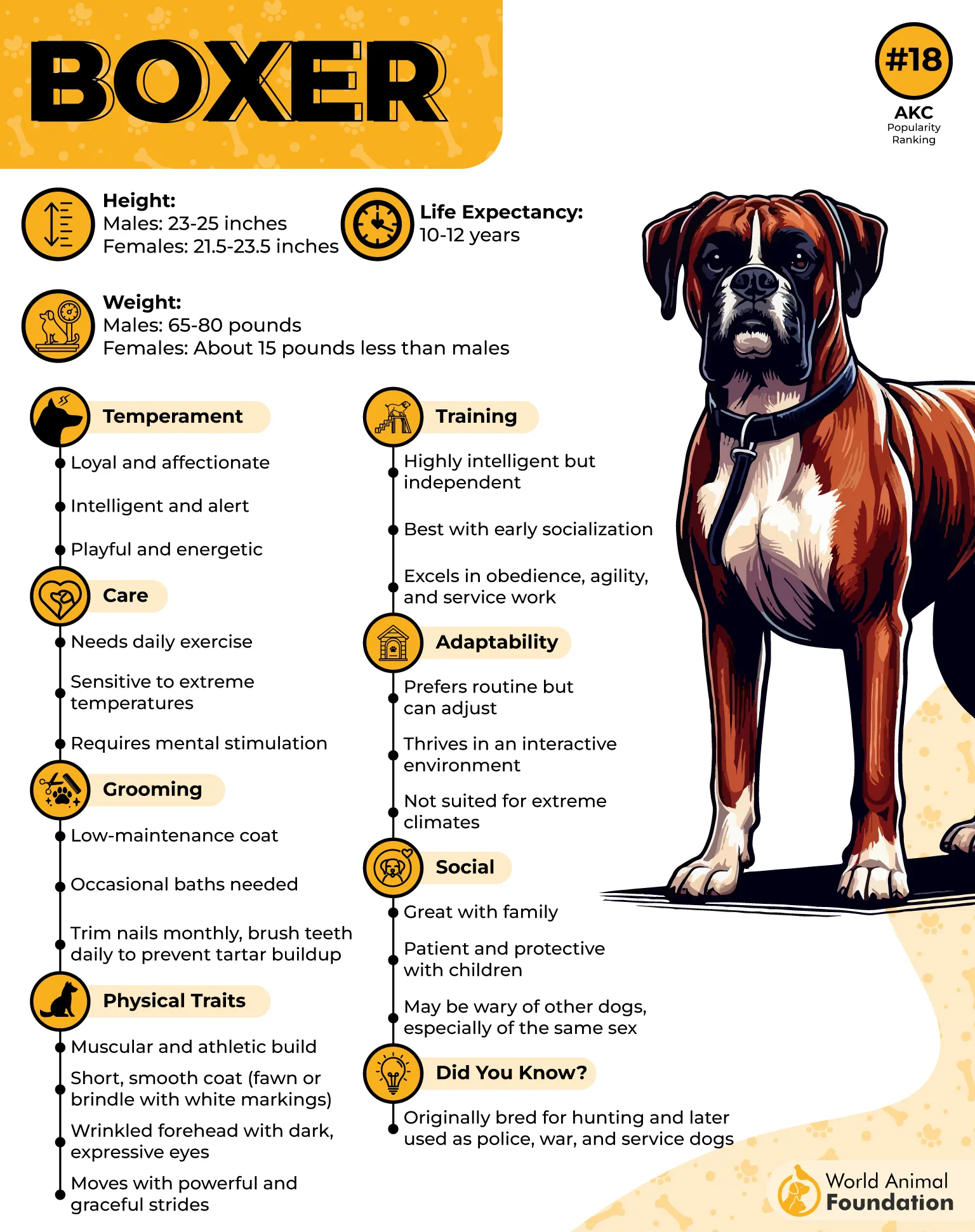
Heart conditions are also a concern, with Boxer cardiomyopathy being a notable example. This disease affects the heart muscle and can lead to fainting or sudden death if untreated. Early detection through regular check-ups is crucial for maintaining quality of life.
Joint problems, including hip dysplasia and arthritis, are also seen in Boxers. Combined with their active nature, these conditions require careful monitoring and lifestyle adjustments to keep them comfortable and mobile. Balanced exercise is key to avoiding strain.
Despite these challenges, Boxers remain affectionate and loyal companions who bond closely with their families. Their health risks mean they require dedicated care, but many owners find their joyful personalities and strong bonds worth the commitment.
Quick Tips
Schedule routine cancer screenings with your vet.
Provide controlled exercise to protect joints and heart health.
Conclusion
Choosing the right breed is one of the most important decisions a pet owner can make. While many dogs bring joy and companionship, certain breeds are more prone to health problems that can lead to a financial strain and emotional stress. Issues like canine hip dysplasia in large dogs, mitral valve disease in small breeds, or heart disease in elderly dogs can develop at a young age or worsen over time, making pet insurance and proactive veterinary care essential for responsible breeders and pet parents alike.
Even generally healthy dogs, such as Australian Cattle Dogs or Standard Poodles, require attention to nutritional needs, a healthy weight, and regular screenings to prevent life-threatening conditions. Brachycephalic breeds, including French Bulldogs and Boston Terriers, are at risk of respiratory issues, while large breeds like Bernese Mountain Dogs and Great Danes often face joint issues or heart failure. A balanced diet, exercise, and routine checkups help ensure the dog receives the care needed for a happy life.
Other breeds such as Labrador Retrievers, Cavalier King Charles Spaniel, Cocker Spaniels, Border Collies, Golden Retrievers, Miniature Schnauzers, Yorkshire Terriers, and even generally healthy breeds with specific risks like Collie Eye Anomaly or cherry eye, can also develop medical problems, skin issues, or vision impairment. Generally speaking, most dogs can live well when their unique health conditions are understood and managed carefully.


